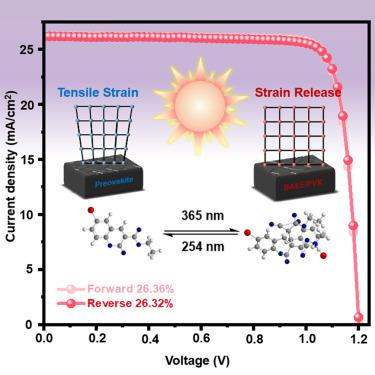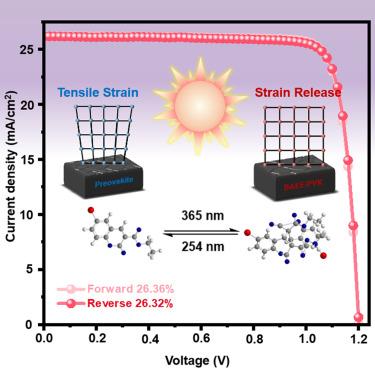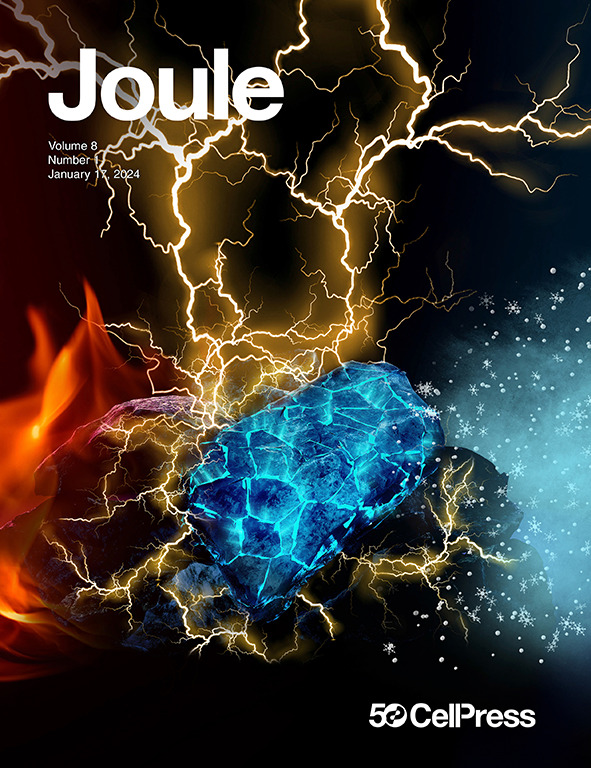分子触发应变调节和界面钝化,实现高效倒置包晶太阳能电池
IF 38.6
1区 材料科学
Q1 CHEMISTRY, PHYSICAL
引用次数: 0
摘要
由于包晶晶格畸变和不同的热膨胀系数,残余拉伸应变阻碍了包晶太阳能电池(PSCs)效率和内在稳定性的提高。在此,我们提出了一种分子触发的应变调节和界面钝化策略,利用 6-溴香豆素-3-羧酸乙酯(BAEE)的[2 + 2]环加成反应,消耗入射紫外光来抑制拉伸应变的演化,从而提高 PSC 的效率和稳定性(尤其是光稳定性)。同时,BAEE 还能与 NiOx 形成强键,促进包晶生长和界面缺陷钝化。我们获得了 26.32% 的效率(认证为 26.08%)、高达 1.201 V 的开路电压(Voc)和较低的 Voc 损耗(0.342 V),以及长期稳定性(连续 365 nm 紫外光照射:在氮气中的 T90 > 110 小时,在环境空气中的 T90 > 6 小时,以及 100 mWcm-2 的 LED 白光连续照射:T90 > 1,000 小时)。本文章由计算机程序翻译,如有差异,请以英文原文为准。


Molecule-triggered strain regulation and interfacial passivation for efficient inverted perovskite solar cells
Residual tensile strain impedes the improvement of efficiency and intrinsic stability of perovskite solar cells (PSCs), resulting from the perovskite lattice distortion and different thermal expansion coefficients. Herein, we propose a molecule-triggered strain regulation and interfacial passivation strategy to enhance the efficiency and stability (especially photostability) of PSCs, which utilizes the [2 + 2] cycloaddition reaction of 6-bromocoumarin-3-carboxylic acid ethyl ester (BAEE), consuming the incident UV light to suppress the tensile strain evolution. Meanwhile, the BAEE can form a strong bond with NiOx, assisting the perovskite growth and the interface defect passivation. We obtain the efficiency of 26.32% (certified 26.08%), the open-circuit voltage (Voc) up to 1.201 V with low Voc loss (0.342 V), as well as the long-term stability (continuous 365 nm UV illumination: T90 > 110 h in N2, T90 > 6 h in ambient air, and continuous LED white light irradiation at 100 mWcm−2: T90 > 1,000 h).
求助全文
通过发布文献求助,成功后即可免费获取论文全文。
去求助
来源期刊

Joule
Energy-General Energy
CiteScore
53.10
自引率
2.00%
发文量
198
期刊介绍:
Joule is a sister journal to Cell that focuses on research, analysis, and ideas related to sustainable energy. It aims to address the global challenge of the need for more sustainable energy solutions. Joule is a forward-looking journal that bridges disciplines and scales of energy research. It connects researchers and analysts working on scientific, technical, economic, policy, and social challenges related to sustainable energy. The journal covers a wide range of energy research, from fundamental laboratory studies on energy conversion and storage to global-level analysis. Joule aims to highlight and amplify the implications, challenges, and opportunities of novel energy research for different groups in the field.
 求助内容:
求助内容: 应助结果提醒方式:
应助结果提醒方式:


